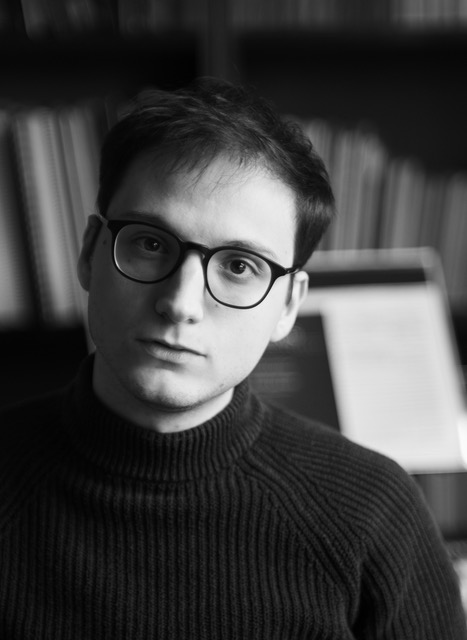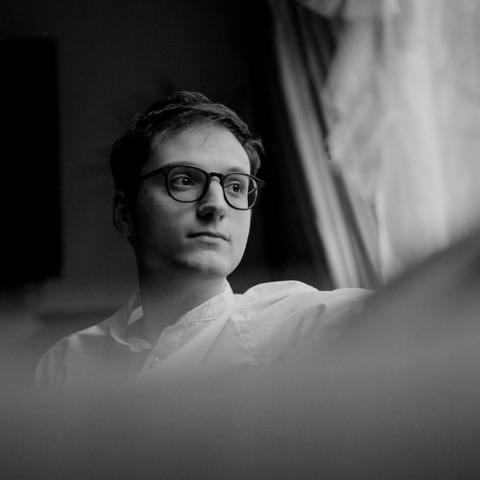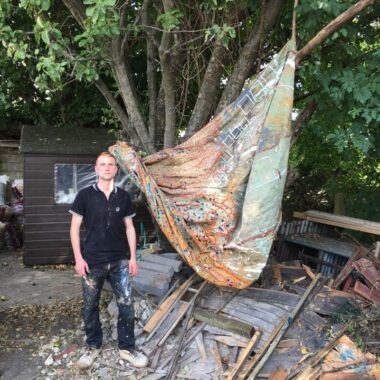Euchar Gravina is the Artistic Director of the Waterloo Festival, an annual arts and community celebration based at St John’s.
For the past few years, he has worked with the London Group to host a series of exciting art exhibitions in, around and under the Church. He is also a composer and musical director.

I was born in Malta, my mum was forty-five when she had me, and my dad fifty, which was quite old for that time. So I was brought up in a family of grown-ups, with an expectation of me being mature. Ours was a very traditional Maltese family, all my aunts lived on the same road as us, and family ties were very important.
Malta is a very Catholic country, and I had a very Catholic upbringing. As a child, my full cultural calendar year was centred around all the feasts that happened within the church: I was an altar boy for a long time, I was even an altar boy at the Vatican for one summer: that’s how Catholic my family is. So working in churches has always been second nature to me and, even if I’m not religious anymore, I don’t even think about it. It’s like obvious, where else?
I started to play the piano when I was a kid, then I progressed to the organ because it was there in the church – why not make use of it? So that took off in a way. Where we lived the liturgy was very high church: there were 120 altar boys when I joined, a huge number for a town of just 7000 people. And there was always a choir with an organ, plus we’d get an orchestra in when the feasts came around. So all the music I accessed was through Catholic services. I remember my first compositional attempts were at writing hymns for a mass. I used to pester to have them played because I’d figured out it was the only way I would get to hear my own work being performed.
By the time I was 13 or 14, I knew I wanted to do music later on, so I studied it privately – there really weren’t the music schools in Malta back then. Most of my friends studied law. I have no idea why I took it so seriously, maybe it was my way of breaking away from what everyone expected me to do.
I’m not sure my parents would have encouraged me to do music full time. Not because they didn’t like it, but Malta’s small size meant the opportunities were limited, and there were the traditional concerns about how I was going to make a living. I still can’t believe that my mother got her head around it, but eventually she did. Hats off to both my parents, they bought me a piano, a major investment and a lot of money at a time before Malta joined the EU, when things weren’t as available as they are now. My family still live in Malta. When they hear a piece of mine being played by a Maltese banda (traditional Maltese wind-brass bands), or the church orchestra, for them it’s a huge deal. They can relate to that, and they always message me and tell me how proud they are.
My week now is split between working on projects for St Johns, developing my own composing, private teaching and singing: I run the choir at St John’s, and another one in Waterloo. Plus I sing with the London Symphony Chorus, who perform alongside the LSO: it’s fun to just turn up, slowly work at learning a piece and not be in charge.
Up until lockdown, I was working on 3 or 4 projects at the same time, so during those first days we had to quickly postpone things, and re-launch the Waterloo Festival online instead. I kept working on my composing throughout, and it was actually good to spend more time on it. I found I could be more free and personal, as I knew that there wouldn’t be anyone’s eyes on it for a while. So I’ve got more balance. It’s given me a small dose of confidence and was really helpful.
As a composer, I write solo pieces, small chamber pieces through to orchestral works: I work on creative projects of my own, be it new compositions or commissions, devising new plans or exploring new collaborations. Sometimes I dabble in the use of electronics, and explore the amalgamation of found or recorded material, especially of the same piece and how that can be used, and manipulated electronically with the music.
This year’s plans for the Waterloo Festival are coming on but Covid and the redevelopment project has delayed everything. The deadline for refurbishing St Johns was supposed to be April or May: the acoustic work is going to take a bit longer, but it will be worth the additional wait. The new building will be far more open, accessible and welcoming: there will be a new foyer and places for meetings and exhibitions. Plus a new lift to the refurbished crypt, we’ve discovered beautiful brick patterns in the vaulted ceilings down there.
St John’s has always had a strong connection with the homeless community. We offer a welcome to people who are just passing by, who maybe want to sit down for 5 minutes and move on. It’s a very common thing for people who are rough sleepers, who just want to come in out of the cold for a while. Not everyone feels they want to engage but might just choose the comfort of being there.
Plus lots of people come to St John’s because they like what we do, our ethos, the creativity, being super LBGT friendly, and eco-conscious. Or if they’re religious, because of the way the liturgy runs, or our beliefs in an inclusive community.
So a lot of my work is to find St John’s place in all of this, how do we make the building accessible and bring all these people together? Hiring out our venues means that we can fund projects like the Waterloo Festival, and projects in local hostels, employment training courses, and therapy sessions. It’s our responsibility to translate this into what we do with the space.
The relationship between St John’s and The London Group has been going strong for about five years now. Susan Haire PPLG already had an idea of us doing some work together, so my colleagues and I just welcomed it as a great opportunity to have top artists coming to use our building. The London Group has turned out to be a wonderful group to work with: every time we organise something, so many members have come to support us: not just our community events, but on practical things, like setting up, understanding the limitations of the building, and working creatively around that. It’s been lovely to see, the enthusiasm has been real and mutual.
For us, working with The London Group has become the highlight of the Waterloo Festival each year. We’re a small organisation, and the biggest resource we have is our space. We don’t have huge amounts of funding, and we work with a transient community, so it’s been good for us to offer what we have and to find people who really appreciate that, to make something out of this which is beneficial to the people we want to reach.
Even on a basic level, to have someone walk around St John’s garden for an extra 5 minutes, to have people taking notice is a real triumph for us, and maybe next time they may stay even longer when they see our name. It’s a long process of building trust with your audience. And The London Group exhibitions have definitely helped with that.
Euchar Gravina was in conversation with Claire Parrish LG, 2022
Waterloo Festival







